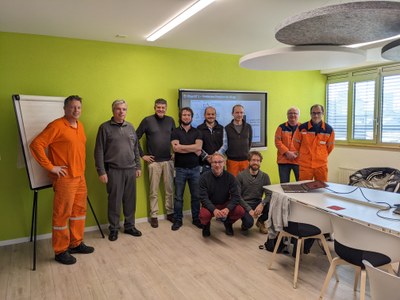Aluminum parts manufacturing optimized with AI
With 300 new applications per year, a manufacturer as Constellium Valais produces a vast variety of aluminum objects. The extrusion process, shaping aluminum by pressing an aluminum bar, is very complex and versatile. Each new request requires a huge engineering effort, especially to define if the desired profile can be manufactured and at what cost, then to design the tool and the production recipe. One of the essential tasks of this analysis is to search for profiles similar to the one requested by the customer in the production history in order to complete the personal experience of specialists who study its manufacturability and predict the pressure of the press during extrusion.
The goal of the P3 (Press Pressure Prediction) Innosuisse project, coordinated by the SPL research group of the HEI Valais and in partnership with Constellium Valais SA, was to use artificial intelligence technologies to help experts conduct the feasibility study. This goal has been achieved through the development of powerful tools to search for similar profiles in the production history as well as press pressure prediction. At Idiap, it was the Perception & Activity Understanding group which participated to this 100% from Valais collaboration.

Project members during the closing day. From left to right. Up: Fabrice Balet (Constellium), Raoul Rey (Constellium), Paul Robillard (Constellium), Rémy Siegfried (Idiap), Michael Villamizar (Idiap), Bruce Morère (Constellium), Roland Vogel (Constellium), Alexis Bacha (Constellium). Down: Jean-Marc Odobez (Idiap), Steve Devènes (HEI). Silvan Zahno (HEI), project coordinator, could not be present.
How does such a tool work?
In order to obtain the important quantity of data necessary to artificial intelligence methods, Constellium has made a significant effort to retrieve all production data. This includes more than 1’200 drafts of already profiles manufactured profiles, as well as data from 730,000 extrusions of these profiles in the form of extrusion parameters, such as heating temperature, as well as measurements on the press, like the pressure curve.
Once treated, this information has made it possible to design and train two models: a neural network which extract a characteristic signature of the shape of a profile from its image, and which then allows to quickly find similar profiles in the database; and a conditional neural network that predicts the pressure during extrusion for a specific speed and temperature. Finally, a graphical interface developed by HEI has been implemented to allow engineers and operators to easily use the developed models according to their daily needs.
What experts say?
Today in 2023, 18 months after the beginning of the project, the experts of Constellium Valais say they are very satisfied with this new tool. The test they made demonstrated that thanks to the tool, they were able to quickly find profiles similar to the one to be evaluated. It also provided them with new means of analysis allowing them to quickly simulate pressure throughout the extrusion process. A scientific paper detailing this work and its results in the framework of the P3 project is currently being submitted.
“This new tool is in the process of being adopted by our industrial partners, and undoubtedly still requires some improvements, but their satisfaction allows us to describe this project as a fruitful collaboration between research and industry in Valais”, says Jean-Marc Odobez, head of the Perception & Activity Understanding group at Idiap. “Our partners at Constellium quickly found new ways to use and improve model predictions. They were particularly interested by the accessibility and speed of the final software, which complement their current analysis tools”, adds Rémy Siegfried, post-doctoral student from Jean-Marc’s team.
More information
- Perception & Activity Understanding group
- Smart Process Lab at HEI Valais
- “P3 : Press Pressure Prediciton” research project
- Scientific paper submitted : Siegfried, M. Villamizar, S. Devènes, R. Rey, A. Bacha, B. Morere, S. Zahno, J.-M. Odobez, Deep learning-based tools leveraging production data to improve manufacturability, currently in review.
